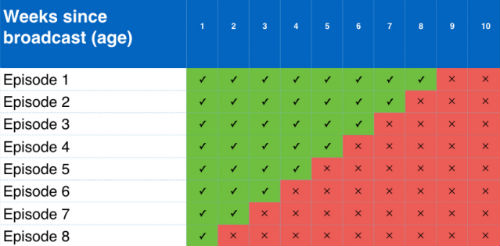 Over the past decade, TV and movie companies have taken part in a massive experiment in which they’ve had to reinvent their business models, adopting to rapidly changing demands from consumers.
Over the past decade, TV and movie companies have taken part in a massive experiment in which they’ve had to reinvent their business models, adopting to rapidly changing demands from consumers.
The first wave of change was triggered by BitTorrent, which allowed downloading huge video files with ease, something that wasn’t possible before.
The movie industry responded by offering their own online video download options, and with bandwidth getting cheaper and more readily available, streaming services soon followed.
However, having legal options available is just a tiny part of the puzzle. The next challenge is to set them up in a way so that people will actually use them, while optimizing revenue long-term. For example, should you allow people to stream your content for free online?
A new study by Carnegie Mellon University researchers aims to provide some empirical evidence on this issue. Using streaming and sales data for the popular show Downton Abbey, provided by PBS, they estimate the impact of free streaming on direct download (EST) sales.
The results, published in a paper for the upcoming International Conference on Information Systems, show that legal streaming options can hurt download sales significantly.
The researchers were able to estimate the impact in a natural experiment, since PBS was required to pull the free streams for all episodes at the same time. This means that some were streamable for more than a month, while others only for a week, or two.

In addition, they had sales data for several seasons, allowing them to make an alternative comparison between years, where the streaming windows varied. In both cases, they show that free streaming cannibalizes download sales.
“Our analysis in our primary specification indicates that availability in the free streaming window reduces EST sales by 8.4%. Using an alternative specification we find that free availability reduces EST sales by 9.9%,” they write.
The negative effect is not unexpected. However, it doesn’t mean that it is wrong to offer free streaming in the long run, as there are several positive side-effects. That’s where the puzzle starts to get complicated.
“For example, free streaming platforms owned by the broadcast network can draw new users to the platform, providing the network with valuable data about its viewers, and a stronger platform as consumers switch from consumption through broadcast television to online stream,” the researchers note.
“Networks also benefit from advertising sponsorship on their streaming channels. Streaming platforms may also enable customer discovery of other shows, or increase overall consumer goodwill,” they add.
And then there’s still piracy.
While unathorized downloads and streams weren’t factored into this study, the researchers point out that previous research has shown that making content legally available decreases demand for piracy.
For example, a 2015 study revealed that ABC’s decision to add their content to Hulu reduced piracy for this content. This shows that legal streaming may also have a positive long-term effect by decreasing people’s piracy habits.
Although the current results are important from a managerial perspective, it might just leave more questions than it answered. In any case, the puzzle of how to offer video content while maximizing revenues in the long run, is far from solved.





